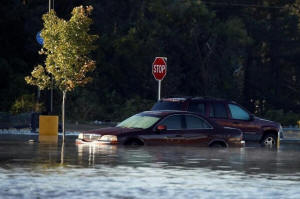|
Death toll climbs as floods swamp North
Carolina after Hurricane Matthew
 Send a link to a friend
Send a link to a friend
 [October 12, 2016]
By Carlo Allegri and Gene Cherry [October 12, 2016]
By Carlo Allegri and Gene Cherry
LUMBERTON, N.C./KINSTON, N.C. (Reuters) -
Flooding in the aftermath of Hurricane Matthew has displaced several
thousand people in North Carolina, and authorities were helping more
evacuate on Tuesday as swollen rivers threatened a wide swath of the
state.
Governor Pat McCrory warned of "extremely dangerous" conditions in the
coming days in central and eastern North Carolina, where several rivers
were at record or near-record levels.
Matthew, the most powerful Atlantic storm since 2007, killed at least
1,000 people in Haiti last week before barreling up the U.S.
southeastern coast and causing at least 30 deaths in Florida, Georgia
and the Carolinas.
McCrory's office said four additional deaths were confirmed on Tuesday
in North Carolina, raising the death toll in the state to 18. One person
was reported as missing.
An additional U.S. death occurred on Monday night in Lumberton, North
Carolina, where officials said a highway patrol officer fatally shot a
man who became hostile and flashed a handgun during search-and-rescue
efforts in fast-running floodwater.

Nearly 4,000 people have taken refuge in North Carolina shelters,
including about 1,200 people in the hard-hit Lumberton area, where the
Lumber River had crested at almost 4 feet (1.2 meters) above the prior
record set in 2004 after Hurricane Frances.
Water blanketed the city of 21,000 people, leaving businesses flooded,
homes with water up to their roof lines and drivers stranded after a
stretch of Interstate-95 became impassable.
"We lost everything," said Sarah McCallum, 62, who was staying in a
shelter set up in an agricultural center after floodwaters drove her
from her home of 20 years.
State officials are particularly concerned about victims like McCallum,
who have no flood insurance because they do not live in areas typically
prone to inundation. U.S. President Barack Obama on Monday signed a
disaster declaration for North Carolina, which will make federal funding
available to people in the hardest-hit areas.
Obama approved a similar declaration on Tuesday for South Carolina,
where Matthew made landfall on Saturday. State officials are now urging
residents to prepare for potential flooding from the Waccamaw and Little
Pee Dee rivers.
About 532,000 homes and businesses remained without power in the U.S.
Southeast on Tuesday, down from the peak of around 2.2 million on Sunday
morning when the storm was still battering the Carolina coasts.
[to top of second column] |

Flooded cars are pictured after Hurricane Matthew passes in
Lumberton, North Carolina, U.S., October 11, 2016. REUTERS/Carlo
Allegri

WORST FLOODING SINCE FLOYD
Matthew dumped more than a foot (30 cm) of rain in areas of North
Carolina already soaked from heavy September rainfall. It has
triggered the worst flooding in the state since Hurricane Floyd in
September 1999, the National Weather Service said.
That storm caused devastating floods in North Carolina, resulting in
35 deaths, 7,000 destroyed homes and more than $3 billion in damages
in the state.
In Matthew's wake, officials are monitoring a number of overtopped
or breaching dams in addition to the threat of inland river
flooding, the governor's office said.
Concerns about a potential breach of the Woodlake Dam, which led to
overnight evacuations in the central North Carolina town of Spring
Lake, had eased by Tuesday afternoon after it was reinforced with
700 sandbags, but a mandatory evacuation was still in effect for
nearby residents.
McCrory warned that the Tar River was expected to crest on Wednesday
in Greenville, where a mandatory evacuation order is already in
place.
Officials remain concerned about Kinston, where significant flooding
was already occurring from the Neuse River, which is expected to
crest at about 27 feet (8 meters) on Saturday, just shy of the Floyd
record.
Retired construction worker Wesley Turner, 71, said he fled his home
near Kinston with his dogs on Friday after his power went out and
the water quickly rose to about chest deep.

After several nights in a shelter, he did not know on Tuesday
whether he had anything to return to.
"I can't get to my house because it is under water," Turner said.
(Additional reporting by Letitia Stein and Joseph Ax; Writing by
Colleen Jenkins; Editing by Bill Trott, Tom Brown and Bill Rigby)
[© 2016 Thomson Reuters. All rights
reserved.]
Copyright 2016 Reuters. All rights reserved. This material may not be published,
broadcast, rewritten or redistributed. |